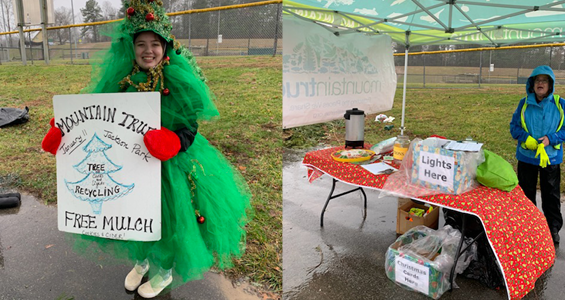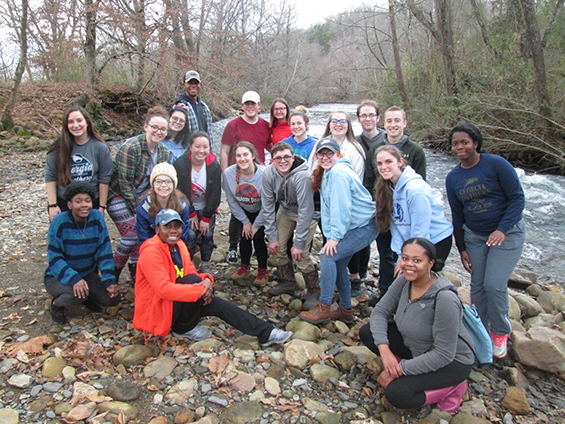On January 2, MountainTrue, other community partners and our legal counsel the Southern Environmental Law Center (SELC) announced a historic settlement with Duke Energy and the N.C. Department of Environmental Quality.
The agreement mandates that 80 million tons of coal ash will be excavated from six Duke Energy coal ash sites: Allen, Belews Creek, Cliffside, Marshall, Mayo, and Roxboro. Prior settlements and court orders require cleanups and excavation of coal ash at the eight other Duke Energy sites in North Carolina for the excavation of 46 million tons of coal ash. This agreement now puts in place a comprehensive cleanup plan for all coal ash lagoons at all 14 Duke Energy sites in North Carolina under which 126 million tons of ash has been or will be excavated across the state and will result in the largest coal ash cleanup in America to date.
Statement from Julie Mayfield, co-director of MountainTrue:
With this settlement, Duke Energy has committed to fully excavating coal ash at the Rogers/Cliffside Energy Complex and moving it to a lined landfill where it will no longer pollute groundwater and the Broad River. This is the solution we’ve advocated for the last seven years, and it is a huge victory for our environment and for the front line communities most impacted by decades of coal ash pollution.
Statement from David Caldwell, Broad Riverkeeper:
Thanks should be given to the hundreds of local concerned citizens in Rutherford and Cleveland Counties, who showed up, stood up and spoke out at several public meetings. Together we were able to convince NCDEQ, our Department of Environmental Quality, and Duke Energy that moving all of the coal ash, a byproduct of 70 years of burning coal, to dry storage is the safest alternative to closing coal ash basins.
Read the full press release from SELC below.
For Release: January 2, 2020
Contact: SELC, Kathleen Sullivan, 919-945-7106 or ksullivan@selcnc.org
North Carolina Settlement Results in Largest Coal Ash Cleanup in America
Community Groups, N.C. DEQ and Duke Energy Reach Settlement to Clean Up Coal Ash at Six North Carolina Sites
CHAPEL HILL, N.C.—The Southern Environmental Law Center today announced it reached a settlement with Duke Energy and the N.C. Department of Environmental Quality to clean up coal ash at six North Carolina sites on behalf of Appalachian Voices, Stokes County Branch of the NAACP, MountainTrue, Catawba Riverkeeper Foundation, Waterkeeper Alliance, Sierra Club, Roanoke River Basin Association, Cape Fear River Watch, Neuse River Foundation/Sound Rivers, and N.C. State Conference of the NAACP. With this agreement, North Carolina will benefit from the largest coal ash cleanup in America to date.
Approximately 80 million tons of coal ash will be excavated from six Duke Energy coal ash sites: Allen, Belews Creek, Cliffside, Marshall, Mayo, and Roxboro. At each of these sites, coal ash is stored in unlined, leaking pits near waterbodies. Prior settlements and court orders require cleanups and excavation of coal ash at the eight other Duke Energy sites in North Carolina for the excavation of 46 million tons of coal ash: Asheville, Riverbend, Dan River, Sutton, Weatherspoon, Cape Fear, Lee, and Buck. This agreement now puts in place a comprehensive cleanup plan for all coal ash lagoons at all 14 Duke Energy sites in North Carolina under which 126 million tons of ash has been or will be excavated across the state.
In April 2019, the North Carolina Department of Environmental Quality (DEQ) ordered Duke Energy to clean up the remaining six coal ash storage sites in the state that were not yet slated to be cleaned up. Duke Energy appealed those orders, and the Southern Environmental Law Center intervened on behalf of community groups to support cleanup, alongside DEQ.
This agreement resolves Duke Energy’s pending appeals of DEQ’s April order, a state court enforcement proceeding brought by DEQ in which community groups represented by SELC are intervenors, and three federal court actions brought by SELC on behalf of the Roanoke River Basin Association, Stokes County Branch of the NAACP, N.C. State Conference of the NAACP, and Appalachian Voices.
Today’s settlement culminates efforts that began in 2012 when the Southern Environmental Law Center first went to court to seek cleanup of coal ash pollution on behalf of community groups in South Carolina and thereafter brought administrative and legal actions that sought coal ash cleanups in North Carolina. Now every utility in South Carolina is excavating its coal ash from every unlined lagoon in the state and cleanups are required and will be underway at every coal ash site in North Carolina. Coal ash has been, is being, and will be removed from coal ash pits owned by three utilities on rivers that flow through both states.
With the coal ash removal at Marshall and Allen in addition to prior commitments at other sites, approximately 44.5 million tons of coal ash has been and will be excavated from coal ash pits along the Catawba River in North and South Carolina. With the removals at Belews Creek, Mayo, and Roxboro, almost 40 million tons of ash in the Roanoke and Dan River Basins have been and are being moved to lined storage. Almost 17 million tons of coal ash will be removed at Roxboro and over 17 million tons of coal ash will be removed at Marshall while ash already in permitted landfills or structural fills will be subject to additional protective measures including stabilization actions and groundwater and surface water monitoring and remediation.
Over 8 million tons will be excavated at Cliffside on the Broad River.
“This agreement is the culmination of nine years of work by communities across North Carolina and puts in place the most extensive coal ash cleanup in the nation,” said Frank Holleman, senior attorney at the Southern Environmental Law Center which represents the community groups in court seeking coal ash cleanups in North Carolina. “With the agreements and court orders governing eight other coal ash sites, we now have in place a historic cleanup of coal ash lagoons to protect North Carolina’s clean water and families from coal ash pollution. North Carolina’s communities will be safer and North Carolina’s water will be cleaner than they have been in decades.”
Comments from the community groups represented by the Southern Environmental Law Center in various courts to seek cleanup of coal ash pollution at the six North Carolina sites follow.
Amy Adams of Appalachian Voices: “This agreement is a testament to the communities throughout North Carolina that have worked for years to protect their neighborhoods and clean water from coal ash pollution.”
Rev. Gregory Hairston of the Stokes County Branch of the NAACP: “We are thankful for the settlement and count it a major victory for our air, water and environmental justice in the state of North Carolina.”
Brandon Jones, Catawba Riverkeeper at the Catawba Riverkeeper Foundation: “This settlement is a fantastic victory for the Catawba and all North Carolinians and a major step towards protecting water quality for current and future generations. This is one of, if not the largest coal ash cleanup in American history. We are proud to have been a part of this effort from the beginning.”
Julie Mayfield, co-director of MountainTrue: “With this settlement, Duke Energy has committed to fully excavating coal ash at the Rogers/Cliffside Energy Complex and moving it to a lined landfill where it will no longer pollute groundwater and the Broad River. This is the solution we’ve advocated for the last seven years, and it is a huge victory for our environment and for the front line communities most impacted by decades of coal ash pollution.”
Larissa Liebmann, staff attorney at Waterkeeper Alliance; “Duke Energy is doing the right thing and protecting all North Carolina communities and waterways from its toxic legacy. North Carolina Waterkeepers and their partners worked tirelessly to stop the contamination of the
state’s waterways by toxic coal ash; this monumental agreement is a testament to their years of work.”
Dave Rogers, deputy regional director of Sierra Club’s Beyond Coal Campaign: “This agreement is a victory for communities and represents the culmination of years of work across North Carolina to guarantee protections from toxic coal ash pollution for hundreds of families and children.”
Statement by Gene Addesso, Mike Pucci and Greg Goddard, leaders of the Roanoke River Basin Association: “Under this agreement, the Roanoke River and Dan River Basins will see one of the largest coal ash cleanups in the country, with millions of tons of coal ash being moved to lined storage at the Dan River, Belews Creek, Roxboro, and Mayo sites on the river system that flows through communities in North Carolina and Virginia.”
Reverend Dr. T. Anthony Spearman of the N.C. State Conference of the NAACP: “Coal ash pollution is an environmental justice issue, and this agreement will bring more justice to the communities around coal ash sites in North Carolina.”
###
For more than 30 years, the Southern Environmental Law Center has used the power of the law to champion the environment of the Southeast. With more than 80 attorneys and nine offices across the region, SELC is widely recognized as the Southeast’s foremost environmental organization and regional leader. SELC works on a full range of environmental issues to protect our natural resources and the health and well-being of all the people in our region. www.SouthernEnvironment.org


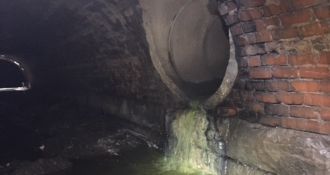
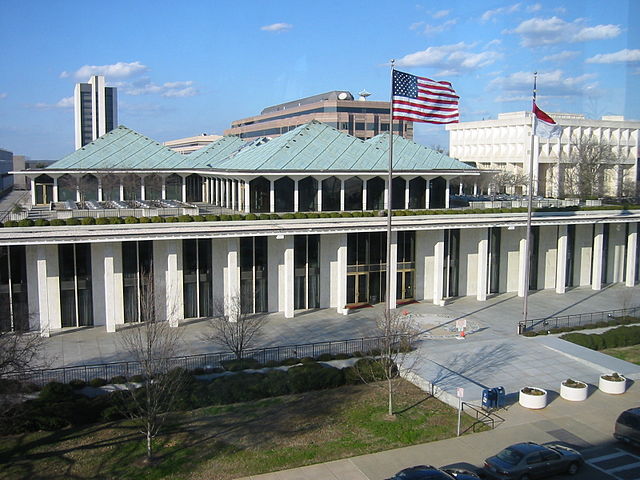
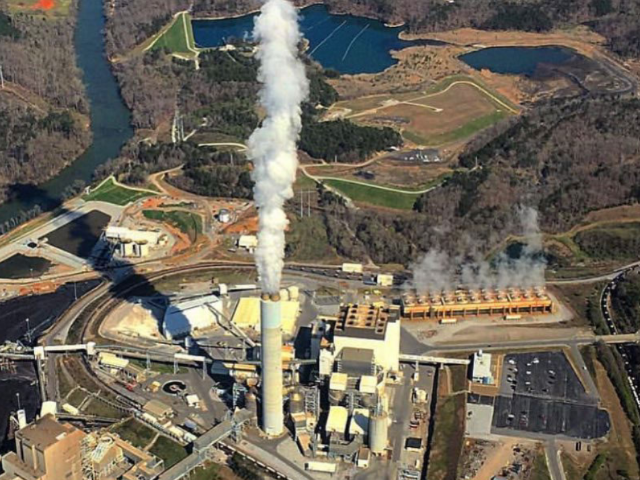
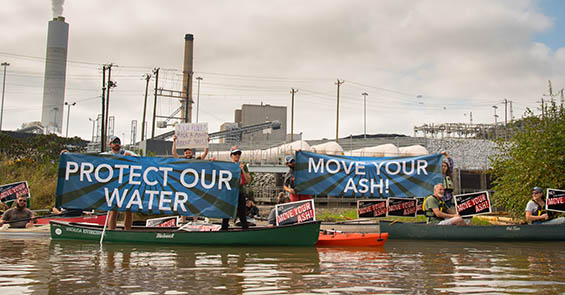
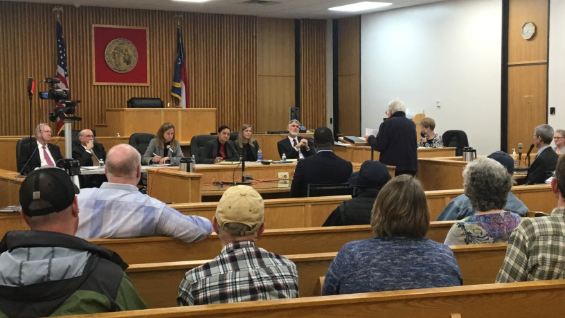 Residents speak out against Duke Energy’s latest rate hike proposal at the NC Utility Commission’s hearing in Franklin on Jan. 15
Residents speak out against Duke Energy’s latest rate hike proposal at the NC Utility Commission’s hearing in Franklin on Jan. 15 Supporters of MountainTrue and the Sierra Club take part in a float on Lake Julian to protest coal ash pollution in October 14, 2014.
Supporters of MountainTrue and the Sierra Club take part in a float on Lake Julian to protest coal ash pollution in October 14, 2014. 